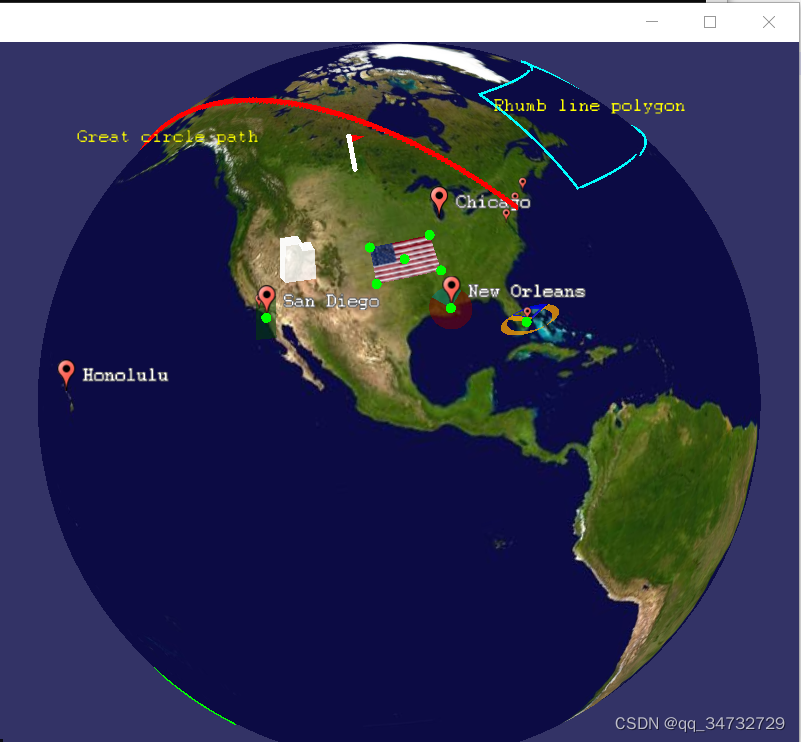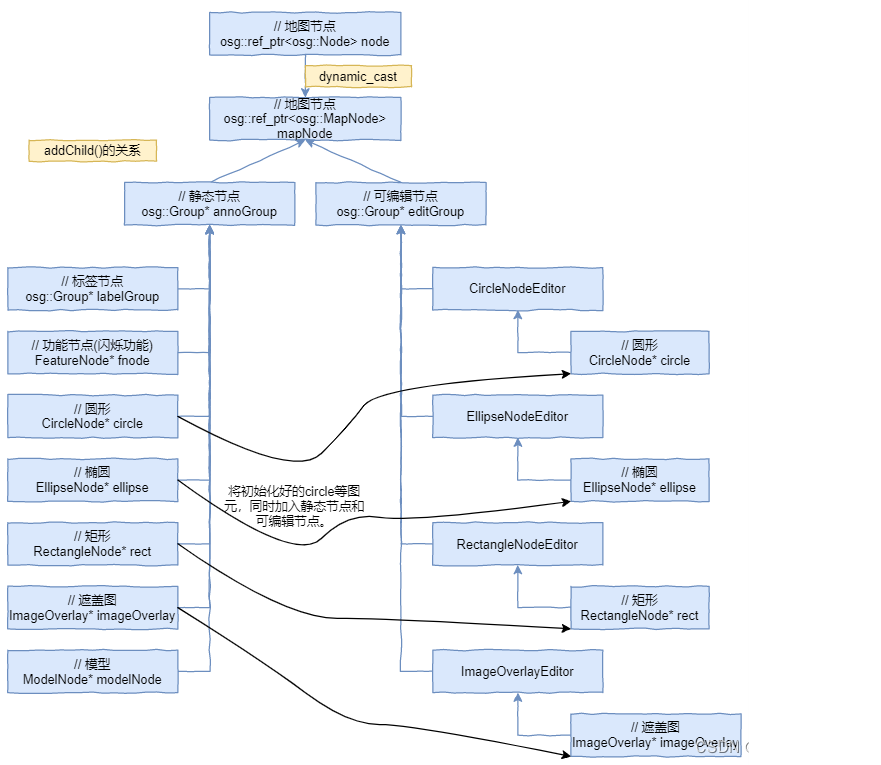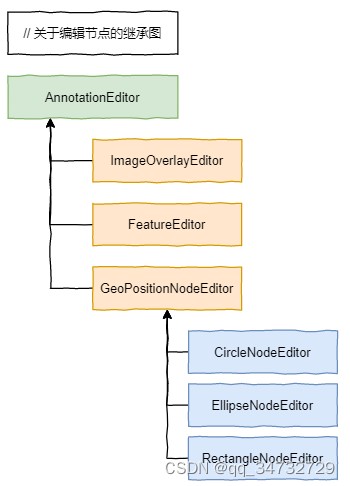前言
本章为osgearth_annotation示例分析,示例中采用osgEarth提供的类,绘制标签、线、billboard、遮盖图、墙等内容。
运行时,在生成的可执行路径下,打开命令框,输入:
osgearth_annotationd.exe xxx.earth为方便测试,这里直接将文件路径写在程序中,直接执行加载earth文件。
效果如下:

addChild关系以及简单类关系


代码分析
#include <osgEarth/MapNode>
#include <osgEarthUtil/EarthManipulator>
#include <osgEarthUtil/ExampleResources>
#include <osgEarthAnnotation/ImageOverlay>
#include <osgEarthAnnotation/CircleNode>
#include <osgEarthAnnotation/RectangleNode>
#include <osgEarthAnnotation/EllipseNode>
#include <osgEarthAnnotation/PlaceNode>
#include <osgEarthAnnotation/LabelNode>
#include <osgEarthAnnotation/LocalGeometryNode>
#include <osgEarthAnnotation/FeatureNode>
#include <osgEarthAnnotation/ModelNode>
#include <osgEarthAnnotation/AnnotationEditing>
#include <osgEarthAnnotation/ImageOverlayEditor>
#include <osgEarthSymbology/GeometryFactory>
#include <osgViewer/Viewer>
#include <osgDB/ReadFile>// 读取earth文件需要加入头文件
using namespace osgEarth;
using namespace osgEarth::Annotation;
using namespace osgEarth::Features;
using namespace osgEarth::Util;
//------------------------------------------------------------------
int
usage( char** argv )
{
OE_WARN << "Usage: " << argv[0] << " <earthfile>" << std::endl;
return -1;
}
//------------------------------------------------------------------
int
main(int argc, char** argv)
{
osg::Group* root = new osg::Group();
// [1 begin] 方式一:通过传入的earth文件参数初始化地球界面
// try to load an earth file.
//osg::ArgumentParser arguments(&argc,argv);
//osgViewer::Viewer viewer(arguments);
//viewer.setCameraManipulator( new EarthManipulator() );
load an earth file and parse demo arguments
//osg::Node* node = MapNodeHelper().load(arguments, &viewer);
//if ( !node )
// return usage(argv);
//root->addChild( node );
// find the map node that we loaded.
//MapNode* mapNode = MapNode::findMapNode(node);
//if ( !mapNode )
// return usage(argv);
// [1 end]
// [2 begin] 方式二,通过readNodeFile方式加载earth文件。方便调试代码测试
const std::string earthFile = "F:/osgData/Data/earth_image/china-simple.earth";
osg::ref_ptr<osg::Node> node = osgDB::readNodeFile(earthFile);// 将earth文件作为一个节点
if (!node.valid())
return -1;
osg::ref_ptr<osgEarth::MapNode> mapNode;
mapNode = dynamic_cast<osgEarth::MapNode*>(node.get());// 强制转换为地图节点
osg::ref_ptr<osgEarth::Util::EarthManipulator> em;
em = new osgEarth::Util::EarthManipulator;
if (!mapNode.valid())
return -1;
em->setNode(mapNode);//因为设置了节点,将忽略“焦点”,节点不会序列化到Config中
em->getSettings()->setArcViewpointTransitions(true);// 获取当前操纵器设置对象的句柄,并转为弧形
osgViewer::Viewer viewer;
viewer.setCameraManipulator(em);// 为主摄像机设置相机操作器
root->addChild(node);// 将地图节点放入根节点,根节点再放入场景。其实也可以直接将node放入场景
// [2 end]
// Group to hold all our annotation elements.
// 后面所有的元素结点均添加到annoGroup结点下
osg::Group* annoGroup = new osg::Group();
MapNode::get(node)->addChild( annoGroup );
// Make a group for labels
osg::Group* labelGroup = new osg::Group();
annoGroup->addChild( labelGroup );
osg::Group* editGroup = new osg::Group();
MapNode::get(node)->addChild( editGroup );
// Style our labels:
Style labelStyle;
labelStyle.getOrCreate<TextSymbol>()->alignment() = TextSymbol::ALIGN_CENTER_CENTER;// label的对齐方式
labelStyle.getOrCreate<TextSymbol>()->fill()->color() = Color::Yellow;// 设置文本颜色
// A lat/long SRS for specifying points.
// 可以理解为 获取 空间参考系,有了参考系,就可以给经纬高进而在指定位置进行绘制
const SpatialReference* geoSRS = mapNode->getMapSRS()->getGeographicSRS();
//--------------------------------------------------------------------
// A series of place nodes (an icon with a text label)
{
Style pm;
pm.getOrCreate<IconSymbol>()->url()->setLiteral( "../data/placemark32.png" );// 图标资源
pm.getOrCreate<IconSymbol>()->declutter() = true;
pm.getOrCreate<TextSymbol>()->halo() = Color("#5f5f5f");// 文本颜色
// bunch of pins:
// GeoPoint 此构造方式中,默认模式为地形高度,贴地标签,高度为0
labelGroup->addChild( new PlaceNode(GeoPoint(geoSRS, -74.00, 40.71), "New York" , pm));
labelGroup->addChild( new PlaceNode(GeoPoint(geoSRS, -77.04, 38.85), "Washington, DC", pm));
labelGroup->addChild( new PlaceNode(GeoPoint(geoSRS,-118.40, 33.93), "Los Angeles" , pm));
labelGroup->addChild( new PlaceNode(GeoPoint(geoSRS, -71.03, 42.37), "Boston" , pm));
labelGroup->addChild( new PlaceNode(GeoPoint(geoSRS,-157.93, 21.35), "Honolulu" , pm));
labelGroup->addChild( new PlaceNode(GeoPoint(geoSRS, 139.75, 35.68), "Tokyo" , pm));
labelGroup->addChild( new PlaceNode(GeoPoint(geoSRS, -90.25, 29.98), "New Orleans" , pm));
labelGroup->addChild( new PlaceNode(GeoPoint(geoSRS, -80.28, 25.82), "Miami" , pm));
labelGroup->addChild( new PlaceNode(GeoPoint(geoSRS,-117.17, 32.72), "San Diego" , pm));
// test with an LOD:
osg::LOD* lod = new osg::LOD();
// 通过lod设置显示范围
lod->addChild( new PlaceNode(GeoPoint(geoSRS, 14.68, 50.0), "Prague", pm), 0.0, 2e6);
labelGroup->addChild( lod );
// absolute altitude:
// GeoPoint 设置了绝对高度。另一个模式是地形以上的高度。
labelGroup->addChild( new PlaceNode(GeoPoint(geoSRS, -87.65, 41.90, 1000, ALTMODE_ABSOLUTE), "Chicago", pm));
}
//--------------------------------------------------------------------
// a box that follows lines of latitude (rhumb line interpolation, the default)
// and flashes on and off using a cull callback.
// 使用剔除回调打开和关闭闪烁
{
struct C : public osg::NodeCallback {
// 重载操作符,并实现回调动画
void operator()(osg::Node* n, osg::NodeVisitor* nv) {
static int i=0;
i++;
if (i % 100 < 50)
traverse(n, nv);
}
};
Geometry* geom = new Polygon();
geom->push_back( osg::Vec3d(0, 40, 0) );
geom->push_back( osg::Vec3d(-60, 40, 0) );
geom->push_back( osg::Vec3d(-60, 60, 0) );
geom->push_back( osg::Vec3d(0, 60, 0) );
Feature* feature = new Feature(geom, geoSRS);
feature->geoInterp() = GEOINTERP_RHUMB_LINE;// 差值方式,直线模式
Style geomStyle;
geomStyle.getOrCreate<LineSymbol>()->stroke()->color() = Color::Cyan;// 线颜色
geomStyle.getOrCreate<LineSymbol>()->stroke()->width() = 5.0f;// 线宽
geomStyle.getOrCreate<LineSymbol>()->tessellationSize() = 75000; // 细分大小
geomStyle.getOrCreate<AltitudeSymbol>()->clamping() = AltitudeSymbol::CLAMP_TO_TERRAIN;// 贴地形
geomStyle.getOrCreate<AltitudeSymbol>()->technique() = AltitudeSymbol::TECHNIQUE_GPU;// GPU渲染贴地几何体
FeatureNode* fnode = new FeatureNode(feature, geomStyle);
fnode->addCullCallback(new C());// 将回调方法设置到节点中
annoGroup->addChild( fnode );
LabelNode* label = new LabelNode("Rhumb line polygon", labelStyle);
label->setPosition(GeoPoint(geoSRS, -30, 50));
labelGroup->addChild(label);
}
//--------------------------------------------------------------------
// another rhumb box that crosses the antimeridian
{
Geometry* geom = new Polygon();// Geometry是Polygon的父类的父类
geom->push_back( -160., -30. );
geom->push_back( 150., -20. );
geom->push_back( 160., -45. );
geom->push_back( -150., -40. );
Style geomStyle;
Feature* feature = new Feature(geom, geoSRS);
feature->geoInterp() = GEOINTERP_RHUMB_LINE;
geomStyle.getOrCreate<LineSymbol>()->stroke()->color() = Color::Lime;
geomStyle.getOrCreate<LineSymbol>()->stroke()->width() = 3.0f;
geomStyle.getOrCreate<LineSymbol>()->tessellationSize() = 75000;
geomStyle.getOrCreate<AltitudeSymbol>()->clamping() = AltitudeSymbol::CLAMP_TO_TERRAIN;
geomStyle.getOrCreate<AltitudeSymbol>()->technique() = AltitudeSymbol::TECHNIQUE_GPU;
FeatureNode* gnode = new FeatureNode(feature, geomStyle);
annoGroup->addChild( gnode );
LabelNode* label = new LabelNode("Antimeridian polygon", labelStyle);
label->setPosition(GeoPoint(geoSRS, -175, -35));
labelGroup->addChild(label);
}
//--------------------------------------------------------------------
// A path using great-circle interpolation.使用大圆插值的路径。
// Keep a pointer to it so we can modify it later on.
FeatureNode* pathNode = 0;
{
Geometry* path = new LineString();
path->push_back( osg::Vec3d(-74, 40.714, 0) ); // New York
path->push_back( osg::Vec3d(139.75, 35.68, 0) ); // Tokyo
Feature* pathFeature = new Feature(path, geoSRS);
pathFeature->geoInterp() = GEOINTERP_GREAT_CIRCLE;// 圆形差值方法
Style pathStyle;
pathStyle.getOrCreate<LineSymbol>()->stroke()->color() = Color::White;
pathStyle.getOrCreate<LineSymbol>()->stroke()->width() = 1.0f;
pathStyle.getOrCreate<LineSymbol>()->stroke()->smooth() = true;
pathStyle.getOrCreate<LineSymbol>()->tessellationSize() = 75000;
pathStyle.getOrCreate<PointSymbol>()->size() = 8;// 线上绘制点的尺寸
pathStyle.getOrCreate<PointSymbol>()->fill()->color() = Color::Red;// 点颜色
pathStyle.getOrCreate<PointSymbol>()->smooth() = true;
pathStyle.getOrCreate<AltitudeSymbol>()->clamping() = AltitudeSymbol::CLAMP_TO_TERRAIN;
pathStyle.getOrCreate<AltitudeSymbol>()->technique() = AltitudeSymbol::TECHNIQUE_GPU;
pathStyle.getOrCreate<RenderSymbol>()->depthOffset()->enabled() = true;
//OE_INFO << "Path extent = " << pathFeature->getExtent().toString() << std::endl;
pathNode = new FeatureNode(pathFeature, pathStyle);
annoGroup->addChild( pathNode );
LabelNode* label = new LabelNode("Great circle path", labelStyle);
label->setPosition(GeoPoint(geoSRS,-170, 61.2));
labelGroup->addChild(label);
}
//--------------------------------------------------------------------
// Two circle segments around New Orleans.
{
Style circleStyle;
circleStyle.getOrCreate<PolygonSymbol>()->fill()->color() = Color(Color::Cyan, 0.5);
circleStyle.getOrCreate<AltitudeSymbol>()->clamping() = AltitudeSymbol::CLAMP_TO_TERRAIN;
circleStyle.getOrCreate<AltitudeSymbol>()->technique() = AltitudeSymbol::TECHNIQUE_DRAPE;// 悬垂
CircleNode* circle = new CircleNode();
circle->set(
GeoPoint(geoSRS, -90.25, 29.98, 1000., ALTMODE_RELATIVE),
Distance(300, Units::KILOMETERS),// 距离和单位
circleStyle,
Angle(-45.0, Units::DEGREES),// 角度
Angle(45.0, Units::DEGREES),
true);
// 绘制并显示circle,如果注释掉此句,则不会显示图形。
annoGroup->addChild( circle );
// 为circle添加编辑点,让editGroup来管理circle的编辑点
editGroup->addChild( new CircleNodeEditor(circle) );
}
{
Style circleStyle;
circleStyle.getOrCreate<PolygonSymbol>()->fill()->color() = Color(Color::Red, 0.5);
circleStyle.getOrCreate<AltitudeSymbol>()->clamping() = AltitudeSymbol::CLAMP_TO_TERRAIN;
circleStyle.getOrCreate<AltitudeSymbol>()->technique() = AltitudeSymbol::TECHNIQUE_DRAPE;
CircleNode* circle = new CircleNode();
circle->set(
GeoPoint(geoSRS, -90.25, 29.98, 1000., ALTMODE_RELATIVE),
Distance(300, Units::KILOMETERS),
circleStyle,
Angle(45.0, Units::DEGREES),
Angle(360.0 - 45.0, Units::DEGREES),
true);// true-使用0-360度,如果为false,则需要使用弧度
annoGroup->addChild( circle );
editGroup->addChild( new CircleNodeEditor(circle) );
}
//--------------------------------------------------------------------
// An extruded ellipse around Miami.
{
Style ellipseStyle;
ellipseStyle.getOrCreate<PolygonSymbol>()->fill()->color() = Color(Color::Orange, 0.75);// 多边形填充色
ellipseStyle.getOrCreate<ExtrusionSymbol>()->height() = 250000.0; // meters MSL 多边形高度,单位m
EllipseNode* ellipse = new EllipseNode();
ellipse->set(
GeoPoint(geoSRS, -80.28, 25.82, 0.0, ALTMODE_RELATIVE),// 地形之上的高度
Distance(250, Units::MILES),// 长半轴
Distance(100, Units::MILES),// 短半轴
Angle (0, Units::DEGREES),// 旋转角度
ellipseStyle,
Angle(45.0, Units::DEGREES),// 开始角度
Angle(360.0 - 45.0, Units::DEGREES), // 结束角度
true); // 角度制
annoGroup->addChild( ellipse );
editGroup->addChild( new EllipseNodeEditor(ellipse) );
}
{
Style ellipseStyle;
ellipseStyle.getOrCreate<PolygonSymbol>()->fill()->color() = Color(Color::Blue, 0.75);
ellipseStyle.getOrCreate<ExtrusionSymbol>()->height() = 250000.0; // meters MSL
EllipseNode* ellipse = new EllipseNode();
ellipse->set(
GeoPoint(geoSRS, -80.28, 25.82, 0.0, ALTMODE_RELATIVE),
Distance(250, Units::MILES),
Distance(100, Units::MILES),
Angle (0, Units::DEGREES),
ellipseStyle,
Angle(-40.0, Units::DEGREES),
Angle(40.0, Units::DEGREES),
true);
annoGroup->addChild( ellipse );
editGroup->addChild( new EllipseNodeEditor(ellipse) );
}
//--------------------------------------------------------------------
{
// A rectangle around San Diego
Style rectStyle;
rectStyle.getOrCreate<PolygonSymbol>()->fill()->color() = Color(Color::Green, 0.5);
rectStyle.getOrCreate<AltitudeSymbol>()->clamping() = AltitudeSymbol::CLAMP_TO_TERRAIN;// 贴地
rectStyle.getOrCreate<AltitudeSymbol>()->technique() = AltitudeSymbol::TECHNIQUE_DRAPE;
RectangleNode* rect = new RectangleNode(
GeoPoint(geoSRS, -117.172, 32.721),
Distance(300, Units::KILOMETERS ),
Distance(600, Units::KILOMETERS ),
rectStyle);
annoGroup->addChild( rect );
editGroup->addChild( new RectangleNodeEditor(rect) );
}
//--------------------------------------------------------------------
// An extruded polygon roughly the shape of Utah. Here we demonstrate the
// FeatureNode, where you create a geographic geometry and use it as an
// annotation.
{
Geometry* utah = new Polygon();
utah->push_back( -114.052, 37.0 );
utah->push_back( -109.054, 37.0 );
utah->push_back( -109.054, 41.0 );
utah->push_back( -111.040, 41.0 );
utah->push_back( -111.080, 42.059 );
utah->push_back( -114.080, 42.024 );
Style utahStyle;
utahStyle.getOrCreate<ExtrusionSymbol>()->height() = 250000.0; // meters MSL
utahStyle.getOrCreate<PolygonSymbol>()->fill()->color() = Color(Color::White, 0.8);
// 有高度的多边形,且没有顶
Feature* utahFeature = new Feature(utah, geoSRS);
FeatureNode* featureNode = new FeatureNode(utahFeature, utahStyle);
annoGroup->addChild( featureNode );
}
//--------------------------------------------------------------------
// an image overlay.
{
ImageOverlay* imageOverlay = 0L;
osg::ref_ptr<osg::Image> image = osgDB::readRefImageFile( "../data/USFLAG.TGA" );// 读取图片,支持多种格式:ive jpg png gif rgb rgba TGA
if (image.valid())
{
imageOverlay = new ImageOverlay(mapNode, image.get());// 创建一个遮盖图
imageOverlay->setBounds( Bounds( -100.0, 35.0, -90.0, 40.0) );// 设置边界
annoGroup->addChild( imageOverlay );
editGroup->addChild( new ImageOverlayEditor(imageOverlay) );
}
}
//--------------------------------------------------------------------
// a model node with auto scaling.
{
Style style;
style.getOrCreate<ModelSymbol>()->autoScale() = true;// 打开模型自动缩放
style.getOrCreate<ModelSymbol>()->url()->setLiteral("../data/red_flag.osg.50.scale");// 自动放大50倍。在模型后面追加倍数和scale,就会对应缩放这么多倍
ModelNode* modelNode = new ModelNode(mapNode, style);
modelNode->setPosition(GeoPoint(geoSRS, -100, 52));
annoGroup->addChild(modelNode);
}
//--------------------------------------------------------------------
// initialize the viewer:
viewer.setSceneData( root );
// 剔除小特征阈值
viewer.getCamera()->setSmallFeatureCullingPixelSize(-1.0f);
return viewer.run();
}
版权声明:本文为qq_34732729原创文章,遵循 CC 4.0 BY-SA 版权协议,转载请附上原文出处链接和本声明。